18--中学英语同义词辨析大全(I)
图片预览
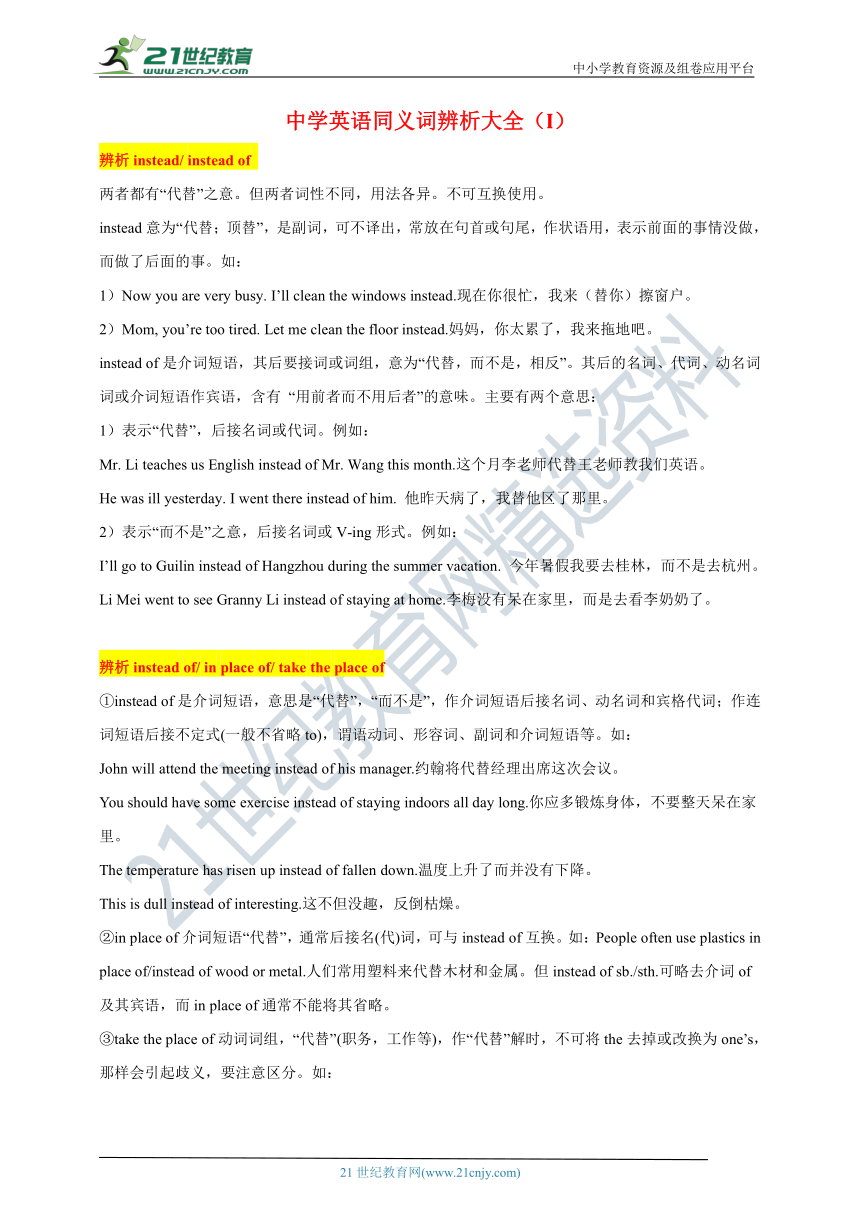
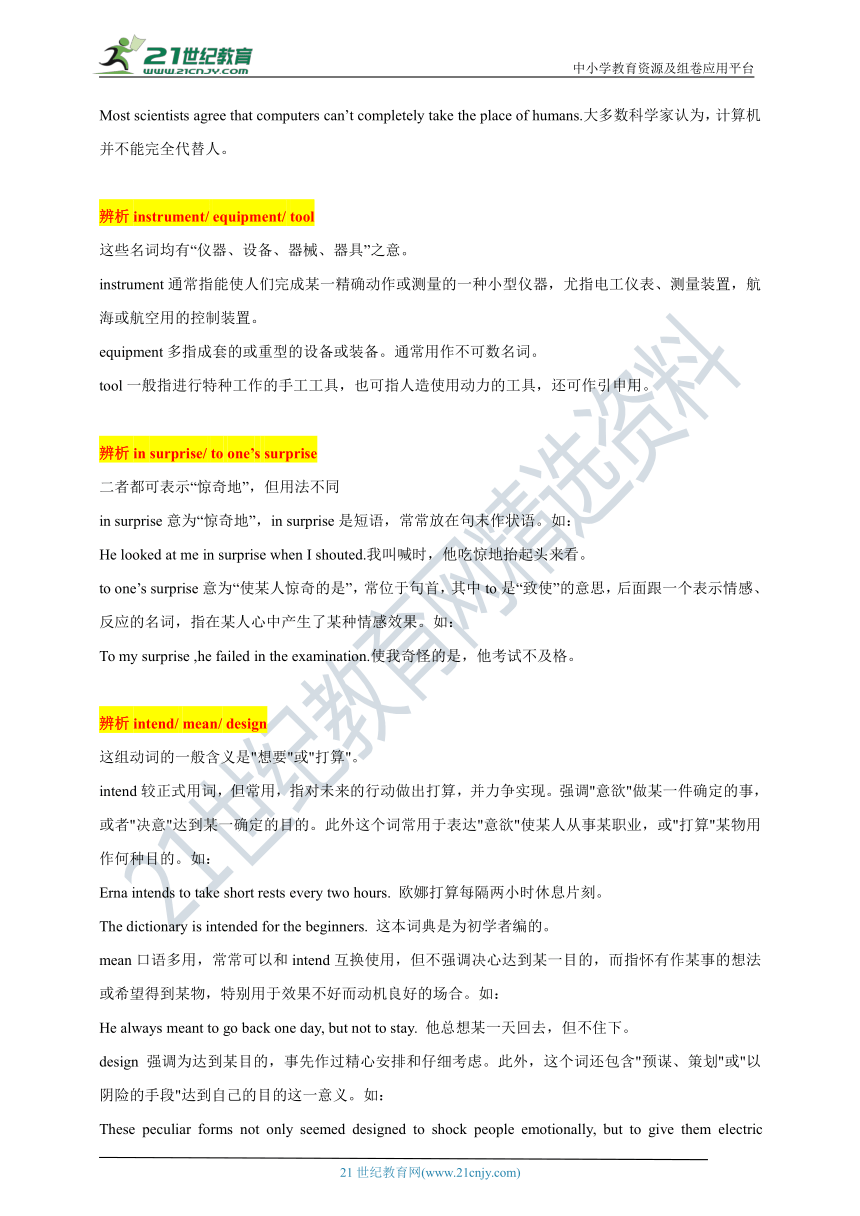
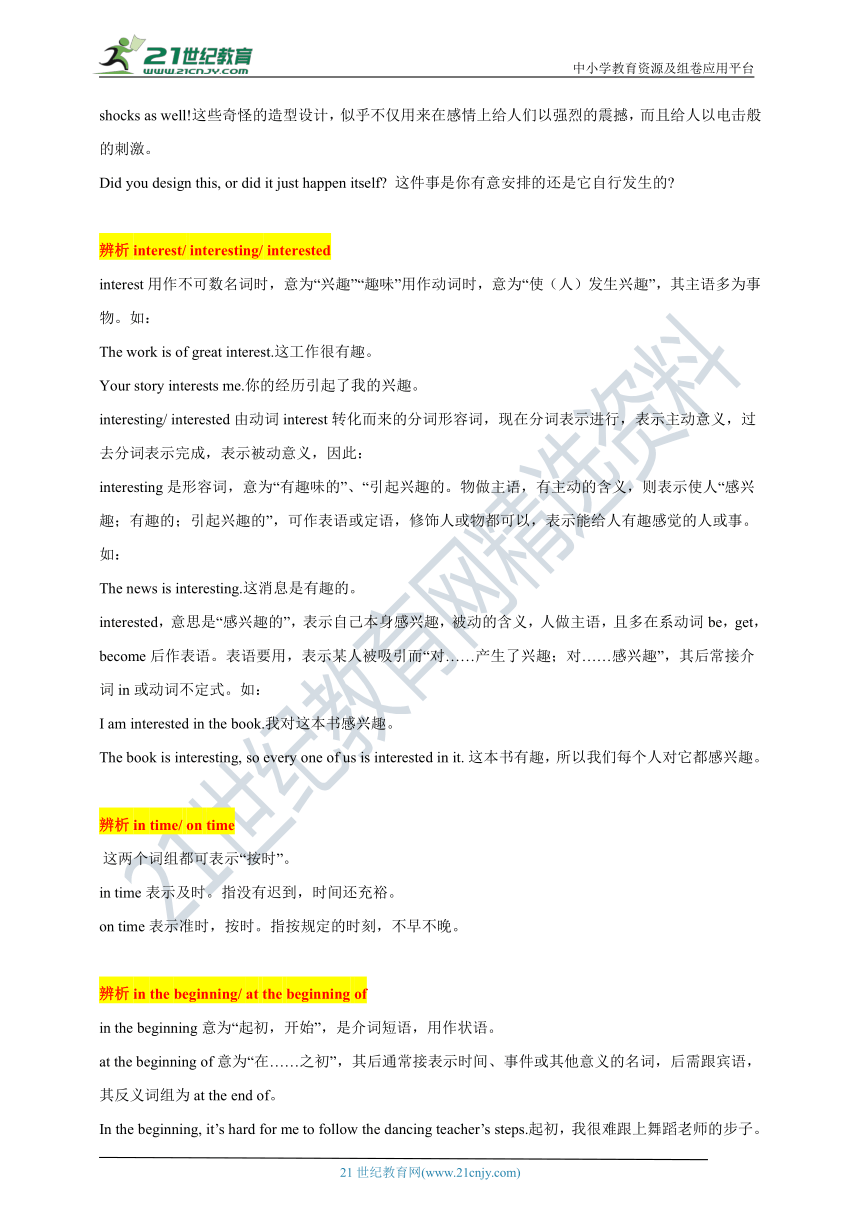
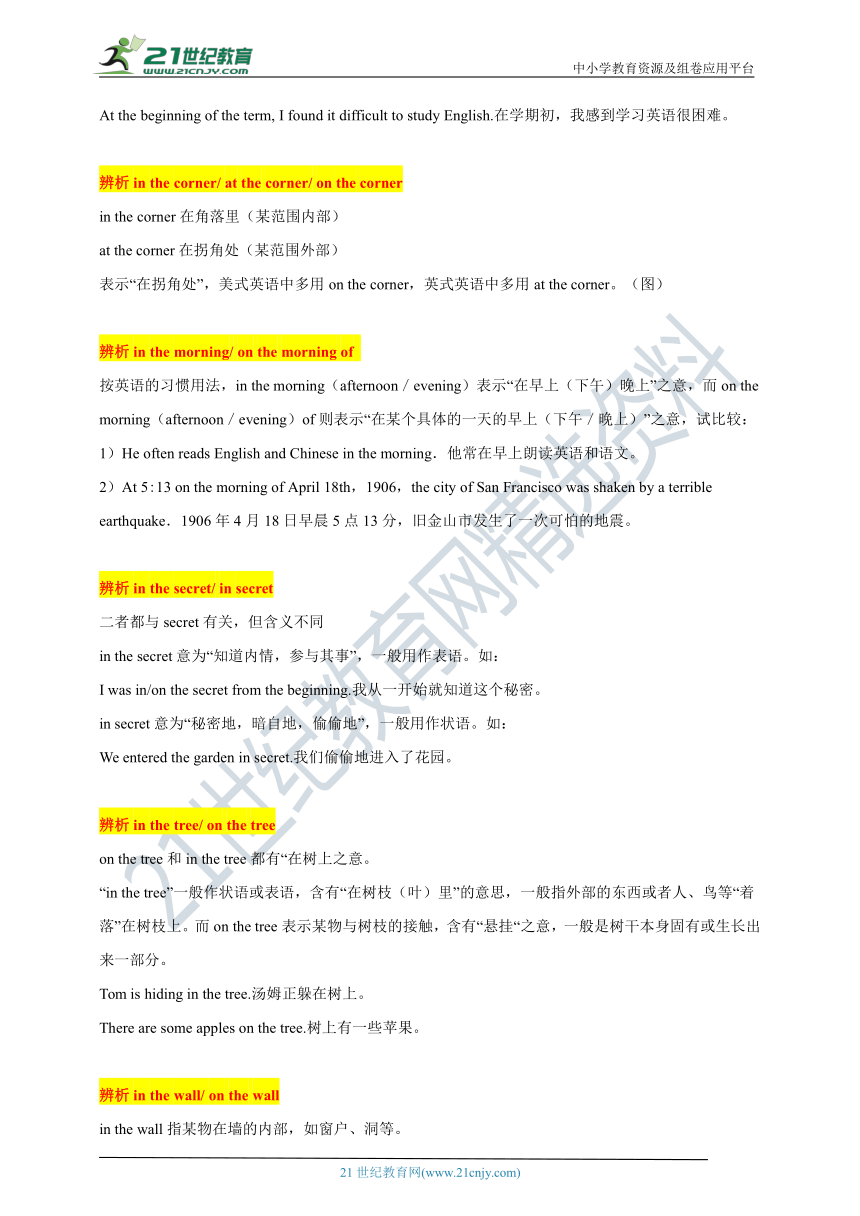
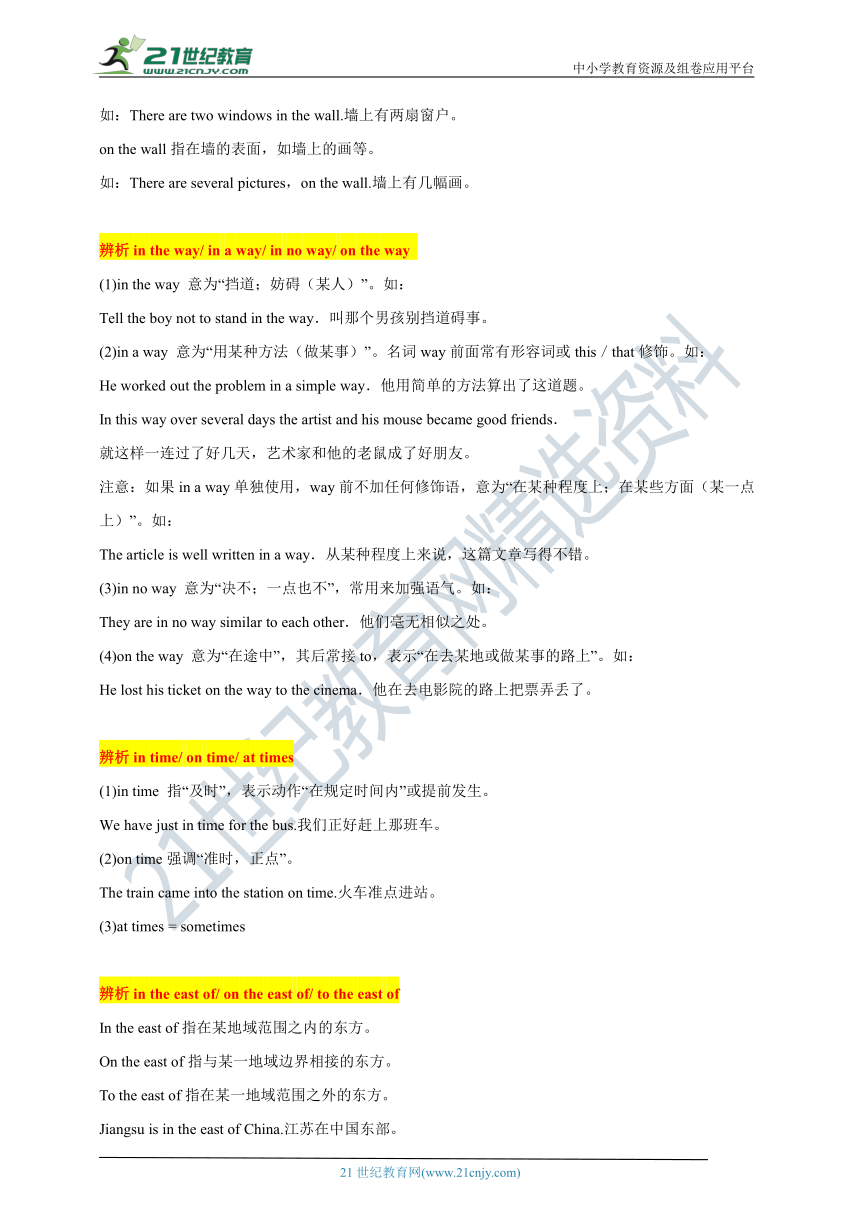
文档简介
中小学教育资源及组卷应用平台
中学英语同义词辨析大全(I)
辨析instead/ instead of
两者都有“代替”之意。但两者词性不同,用法各异。不可互换使用。
instead意为“代替;顶替”,是副词,可不译出,常放在句首或句尾,作状语用,表示前面的事情没做,而做了后面的事。如:
1)Now you are very busy. I’ll clean the windows instead.现在你很忙,我来(替你)擦窗户。
2)Mom, you’re too tired. Let me clean the floor instead.妈妈,你太累了,我来拖地吧。
instead of是介词短语,其后要接词或词组,意为“代替,而不是,相反”。其后的名词、代词、动名词词或介词短语作宾语,含有 “用前者而不用后者”的意味。主要有两个意思:
1)表示“代替”,后接名词或代词。例如:
Mr. Li teaches us English instead of Mr. Wang this month.这个月李老师代替王老师教我们英语。
He was ill yesterday. I went there instead of him. 他昨天病了,我替他区了那里。
2)表示“而不是”之意,后接名词或V-ing形式。例如:
I’ll go to Guilin instead of Hangzhou during the summer vacation. 今年暑假我要去桂林,而不是去杭州。
Li Mei went to see Granny Li instead of staying at home.李梅没有呆在家里,而是去看李奶奶了。
辨析instead of/ in place of/ take the place of
①instead of是介词短语,意思是“代替”,“而不是”,作介词短语后接名词、动名词和宾格代词;作连词短语后接不定式(一般不省略to),谓语动词、形容词、副词和介词短语等。如:
John will attend the meeting instead of his manager.约翰将代替经理出席这次会议。
You should have some exercise instead of staying indoors all day long.你应多锻炼身体,不要整天呆在家里。
The temperature has risen up instead of fallen down.温度上升了而并没有下降。
This is dull instead of interesting.这不但没趣,反倒枯燥。
②in place of介词短语“代替”,通常后接名(代)词,可与instead of互换。如:People often use plastics in place of/instead of wood or metal.人们常用塑料来代替木材和金属。但instead of sb./sth.可略去介词of及其宾语,而in place of通常不能将其省略。
③take the place of动词词组,“代替”(职务,工作等),作“代替”解时,不可将the去掉或改换为one’s,那样会引起歧义,要注意区分。如:
Most scientists agree that computers can’t completely take the place of humans.大多数科学家认为,计算机并不能完全代替人。
辨析instrument/ equipment/ tool
这些名词均有“仪器、设备、器械、器具”之意。
instrument通常指能使人们完成某一精确动作或测量的一种小型仪器,尤指电工仪表、测量装置,航海或航空用的控制装置。
equipment多指成套的或重型的设备或装备。通常用作不可数名词。
tool一般指进行特种工作的手工工具,也可指人造使用动力的工具,还可作引申用。
辨析in surprise/ to one’s surprise
二者都可表示“惊奇地”,但用法不同
in surprise意为“惊奇地”,in surprise是短语,常常放在句末作状语。如:
He looked at me in surprise when I shouted.我叫喊时,他吃惊地抬起头来看。
to one’s surprise意为“使某人惊奇的是”,常位于句首,其中to是“致使”的意思,后面跟一个表示情感、反应的名词,指在某人心中产生了某种情感效果。如:
To my surprise ,he failed in the examination.使我奇怪的是,他考试不及格。
辨析intend/ mean/ design
这组动词的一般含义是"想要"或"打算"。
intend较正式用词,但常用,指对未来的行动做出打算,并力争实现。强调"意欲"做某一件确定的事,或者"决意"达到某一确定的目的。此外这个词常用于表达"意欲"使某人从事某职业,或"打算"某物用作何种目的。如:
Erna intends to take short rests every two hours. 欧娜打算每隔两小时休息片刻。
The dictionary is intended for the beginners. 这本词典是为初学者编的。
mean口语多用,常常可以和intend互换使用,但不强调决心达到某一目的,而指怀有作某事的想法或希望得到某物,特别用于效果不好而动机良好的场合。如:
He always meant to go back one day, but not to stay. 他总想某一天回去,但不住下。
design 强调为达到某目的,事先作过精心安排和仔细考虑。此外,这个词还包含"预谋、策划"或"以阴险的手段"达到自己的目的这一意义。如:
These peculiar forms not only seemed designed to shock people emotionally, but to give them electric shocks as well!这些奇怪的造型设计,似乎不仅用来在感情上给人们以强烈的震撼,而且给人以电击般的刺激。
Did you design this, or did it just happen itself 这件事是你有意安排的还是它自行发生的
辨析interest/ interesting/ interested
interest用作不可数名词时,意为“兴趣”“趣味”用作动词时,意为“使(人)发生兴趣”,其主语多为事物。如:
The work is of great interest.这工作很有趣。
Your story interests me.你的经历引起了我的兴趣。
interesting/ interested由动词interest转化而来的分词形容词,现在分词表示进行,表示主动意义,过去分词表示完成,表示被动意义,因此:
interesting是形容词,意为“有趣味的”、“引起兴趣的。物做主语,有主动的含义,则表示使人“感兴趣;有趣的;引起兴趣的”,可作表语或定语,修饰人或物都可以,表示能给人有趣感觉的人或事。如:
The news is interesting.这消息是有趣的。
interested,意思是“感兴趣的”,表示自己本身感兴趣,被动的含义,人做主语,且多在系动词be,get,become后作表语。表语要用,表示某人被吸引而“对……产生了兴趣;对……感兴趣”,其后常接介词in或动词不定式。如:
I am interested in the book.我对这本书感兴趣。
The book is interesting, so every one of us is interested in it. 这本书有趣,所以我们每个人对它都感兴趣。
辨析in time/ on time
这两个词组都可表示“按时”。
in time表示及时。指没有迟到,时间还充裕。
on time表示准时,按时。指按规定的时刻,不早不晚。
辨析in the beginning/ at the beginning of
in the beginning意为“起初,开始”,是介词短语,用作状语。
at the beginning of意为“在……之初”,其后通常接表示时间、事件或其他意义的名词,后需跟宾语,其反义词组为at the end of。
In the beginning, it’s hard for me to follow the dancing teacher’s steps.起初,我很难跟上舞蹈老师的步子。
At the beginning of the term, I found it difficult to study English.在学期初,我感到学习英语很困难。
辨析in the corner/ at the corner/ on the corner
in the corner在角落里(某范围内部)
at the corner在拐角处(某范围外部)
表示“在拐角处”,美式英语中多用on the corner,英式英语中多用at the corner。(图)
辨析in the morning/ on the morning of
按英语的习惯用法,in the morning(afternoon/evening)表示“在早上(下午)晚上”之意,而on the morning(afternoon/evening)of则表示“在某个具体的一天的早上(下午/晚上)”之意,试比较:
1)He often reads English and Chinese in the morning.他常在早上朗读英语和语文。
2)At 5:13 on the morning of April 18th,1906,the city of San Francisco was shaken by a terrible earthquake.1906年4月18日早晨5点13分,旧金山市发生了一次可怕的地震。
辨析in the secret/ in secret
二者都与secret有关,但含义不同
in the secret意为“知道内情,参与其事”,一般用作表语。如:
I was in/on the secret from the beginning.我从一开始就知道这个秘密。
in secret意为“秘密地,暗自地,偷偷地”,一般用作状语。如:
We entered the garden in secret.我们偷偷地进入了花园。
辨析in the tree/ on the tree
on the tree和in the tree都有“在树上之意。
“in the tree”一般作状语或表语,含有“在树枝(叶)里”的意思,一般指外部的东西或者人、鸟等“着落”在树枝上。而on the tree表示某物与树枝的接触,含有“悬挂“之意,一般是树干本身固有或生长出来一部分。
Tom is hiding in the tree.汤姆正躲在树上。
There are some apples on the tree.树上有一些苹果。
辨析in the wall/ on the wall
in the wall指某物在墙的内部,如窗户、洞等。
如:There are two windows in the wall.墙上有两扇窗户。
on the wall指在墙的表面,如墙上的画等。
如:There are several pictures,on the wall.墙上有几幅画。
辨析in the way/ in a way/ in no way/ on the way
(1)in the way 意为“挡道;妨碍(某人)”。如:
Tell the boy not to stand in the way.叫那个男孩别挡道碍事。
(2)in a way 意为“用某种方法(做某事)”。名词way前面常有形容词或this/that修饰。如:
He worked out the problem in a simple way.他用简单的方法算出了这道题。
In this way over several days the artist and his mouse became good friends.
就这样一连过了好几天,艺术家和他的老鼠成了好朋友。
注意:如果in a way单独使用,way前不加任何修饰语,意为“在某种程度上;在某些方面(某一点上)”。如:
The article is well written in a way.从某种程度上来说,这篇文章写得不错。
(3)in no way 意为“决不;一点也不”,常用来加强语气。如:
They are in no way similar to each other.他们毫无相似之处。
(4)on the way 意为“在途中”,其后常接to,表示“在去某地或做某事的路上”。如:
He lost his ticket on the way to the cinema.他在去电影院的路上把票弄丢了。
辨析in time/ on time/ at times
(1)in time 指“及时”,表示动作“在规定时间内”或提前发生。
We have just in time for the bus.我们正好赶上那班车。
(2)on time强调“准时,正点”。
The train came into the station on time.火车准点进站。
(3)at times = sometimes
辨析in the east of/ on the east of/ to the east of
In the east of指在某地域范围之内的东方。
On the east of指与某一地域边界相接的东方。
To the east of指在某一地域范围之外的东方。
Jiangsu is in the east of China.江苏在中国东部。
Is on the east of Anhui.江苏在安徽东部。
Jiangsu is to the east of Sichuan.江苏位于四川东部。
辨析in turn/ by turns
二者容易被混用,但意思和用法并不相同
in turn意为“依次,轮流地”,侧重指按顺序先后做某事。如:
I heard each of you recite the text in turn.我听见了你们轮流背诵课文。
by turns意为“轮流、依次地”,侧重交替发生某事或轮流做某事。如:
We drove the car by turns.我们流开车。
辨析invent/ discover/ create
1)invent指“发明;创造”,指通过研究和实验而“创造,发明”出前所未有的产品或装置;如:
This kind of machine was invented in the 1970’s.这种机器是七十年代发明的。
He invented an excuse for being absent.他捏造了一个缺席的借口。
Edison didn't discover electricity, but invented the light bulb. 爱迪生不是发现了电,而是发明了灯泡。
2)discover指“发现”某种本来存在,而以前未被发现的事物或未为人所知的东西,如地点、物体或事实等,名词形式是discovery;表示“偶然”或“经过努力”发现客观存在的事物、真理或错误,即指发现原来客观存在但不为人所知的事物,也可表示发现已为人所知的事物的新的性质或用途。如:
He discovered America in 1492.他1492 年发现了美洲。
I discovered that she was a good cook.我发现她很擅长烹饪。
3)create指从无到有“创作”或创作出原本不存东西,如艺术作品、理论等。如:
Shakespeare created many comic characters.莎士比亚创作了很多喜剧人物。
辨析it/ one/ that
三者都可作替代词,但代替的内容不同:
it作替代词,既可替代可数名词,也可替代不可数名词和代词,表示特指,指代上文提到过的那件东西,it只指同一事物,也可以替代前面整个句子的意思。如:
I have an interesting book. Would you like to read it 我有一本有趣的书,你想读吗?
one作替代词,可以替代可数名词,表示泛指,one只指代上文提到的某一个名词,不一定代表同一事物,但one不能替代前面整个句子的意思。one的复数形式是ones;one可以单独使用,其前面也可以有冠词或者形容词以及this,that,which,either等词来修饰,而it和that前面则不能有这些词修饰。如:
I don’t like this pen. Please show me another ore.我不喜欢这枝钢笔,请再拿一枝。
I don’t want these green apple. I want red ones.我不想要这些青苹果,我想要红的。
that作替代词,表示特指,指代上文提到过的那类事物,that指同类事物,也可以替代前面整个句子的意思。为了避免重复,that可以和do连用,构成do that来代表上文提到的动作, 而it和one则没有这种用法。如:
The population of London is larger than that of Washington.伦敦人口比华盛顿人口多。
He was ill. That is the reason why he didn’t come to school.他生病了,这就是他为什么没来上学的原因。
辨析instead/ instead of
两者都有“代替”之意。但两者词性不同,用法各异。不可互换使用。
instead意为“代替;顶替”,是副词,可不译出,常放在句首或句尾,作状语用,表示前面的事情没做,而做了后面的事。如:
1)Now you are very busy. I’ll clean the windows instead.现在你很忙,我来(替你)擦窗户。
2)Mom, you’re too tired. Let me clean the floor instead.妈妈,你太累了,我来拖地吧。
instead of是介词短语,其后要接词或词组,意为“代替,而不是,相反”。其后的名词、代词、动名词词或介词短语作宾语,含有“用前者而不用后者”的意味。主要有两个意思:
1)表示“代替”,后接名词或代词。例如:
Mr. Li teaches us English instead of Mr. Wang this month.这个月李老师代替王老师教我们英语。
He was ill yesterday. I went there instead of him. 他昨天病了,我替他区了那里。
2)表示“而不是”之意,后接名词或V-ing 形式。例如:
I’ll go to Guilin instead of Hangzhou during the summer vacation. 今年暑假我要去桂林,而不是去杭州。
Li Mei went to see Granny Li instead of staying at home.李梅没有呆在家里,而是去看李奶奶了。
辨析instead of/ in place of/ take the place of
①instead of是介词短语,意思是“代替”,“而不是”,作介词短语后接名词、动名词和宾格代词;作连词短语后接不定式(一般不省略to),谓语动词、形容词、副词和介词短语等。如:
John will attend the meeting instead of his manager.约翰将代替经理出席这次会议。
You should have some exercise instead of staying indoors all day long.你应多锻炼身体,不要整天呆在家里。
The temperature has risen up instead of fallen down.温度上升了而并没有下降。
This is dull instead of interesting.这不但没趣,反倒枯燥。
②in place of介词短语“代替”,通常后接名(代)词,可与instead of互换。如:People often use plastics in place of/instead of wood or metal.人们常用塑料来代替木材和金属。但instead of sb./sth.可略去介词of及其宾语,而in place of通常不能将其省略。
③take the place of动词词组,“代替”(职务,工作等),作“代替”解时,不可将the去掉或改换为one’s,那样会引起歧义,要注意区分。如:
Most scientists agree that computers can’t completely take the place of humans.大多数科学家认为,计算机并不能完全代替人。
辨析instrument/ equipment/ tool
这些名词均有“仪器、设备、器械、器具”之意。
instrument通常指能使人们完成某一精确动作或测量的一种小型仪器,尤指电工仪表、测量装置,航海或航空用的控制装置。
equipment多指成套的或重型的设备或装备。通常用作不可数名词。
tool一般指进行特种工作的手工工具,也可指人造使用动力的工具,还可作引申用。
辨析in surprise/ to one’s surprise
二者都可表示“惊奇地”,但用法不同
in surprise意为“惊奇地”,in surprise是短语,常常放在句末作状语。如:
He looked at me in surprise when I shouted.我叫喊时,他吃惊地抬起头来看。
to one’s surprise意为“使某人惊奇的是”,常位于句首,其中to是“致使”的意思,后面跟一个表示情感、反应的名词,指在某人心中产生了某种情感效果。如:
To my surprise, he failed in the examination.使我奇怪的是,他考试不及格。
辨析intend/ mean/ design
这组动词的一般含义是"想要"或"打算"。
intend较正式用词,但常用,指对未来的行动做出打算,并力争实现。强调"意欲"做某一件确定的事,或者"决意"达到某一确定的目的。此外这个词常用于表达"意欲"使某人从事某职业,或"打算"某物用作何种目的。如:
Erna intends to take short rests every two hours. 欧娜打算每隔两小时休息片刻。
The dictionary is intended for the beginners. 这本词典是为初学者编的。
mean口语多用,常常可以和intend互换使用,但不强调决心达到某一目的,而指怀有作某事的想法或希望得到某物,特别用于效果不好而动机良好的场合。如:
He always meant to go back one day, but not to stay. 他总想某一天回去,但不住下。
design 强调为达到某目的,事先作过精心安排和仔细考虑。此外,这个词还包含"预谋、策划"或"以阴险的手段"达到自己的目的这一意义。如:
These peculiar forms not only seemed designed to shock people emotionally, but to give them electric shocks as well!这些奇怪的造型设计,似乎不仅用来在感情上给人们以强烈的震撼,而且给人以电击般的刺激。
Did you design this, or did it just happen itself 这件事是你有意安排的还是它自行发生的
辨析interest/ interesting/ interested
interest用作不可数名词时,意为“兴趣”“趣味”用作动词时,意为“使(人)发生兴趣”,其主语多为事物。如:
The work is of great interest.这工作很有趣。
Your story interests me.你的经历引起了我的兴趣。
interesting/ interested由动词interest转化而来的分词形容词,现在分词表示进行,表示主动意义,过去分词表示完成,表示被动意义,因此:
interesting是形容词,意为“有趣味的”、“引起兴趣的。物做主语,有主动的含义,则表示使人“感兴趣;有趣的;引起兴趣的”,可作表语或定语,修饰人或物都可以,表示能给人有趣感觉的人或事。如:
The news is interesting.这消息是有趣的。
interested,意思是“感兴趣的”,表示自己本身感兴趣,被动的含义,人做主语,且多在系动词be,get,become后作表语。表语要用,表示某人被吸引而“对……产生了兴趣;对……感兴趣”,其后常接介词in或动词不定式。如:
I am interested in the book.我对这本书感兴趣。
The book is interesting, so every one of us is interested in it. 这本书有趣,所以我们每个人对它都感兴趣。
辨析in time/ on time
这两个词组都可表示“按时”。
in time表示及时。指没有迟到,时间还充裕。
on time表示准时,按时。指按规定的时刻,不早不晚。
辨析in the beginning/ at the beginning of
in the beginning意为“起初,开始”,是介词短语,用作状语。
at the beginning of意为“在……之初”,其后通常接表示时间、事件或其他意义的名词,后需跟宾语,其反义词组为at the end of。
In the beginning, it’s hard for me to follow the dancing teacher’s steps.起初,我很难跟上舞蹈老师的步子。
At the beginning of the term, I found it difficult to study English.在学期初,我感到学习英语很困难。
辨析in the corner/ at the corner/ on the corner
in the corner在角落里(某范围内部)
at the corner在拐角处(某范围外部)
表示“在拐角处”,美式英语中多用on the corner,英式英语中多用at the corner。(图)
辨析in the morning;on the morning of
按英语的习惯用法,in the morning(afternoon/evening)表示“在早上(下午)晚上”之意,而on the morning(afternoon/evening)of则表示“在某个具体的一天的早上(下午/晚上)”之意,试比较:
1)He often reads English and Chinese in the morning.他常在早上朗读英语和语文。
2)At 5∶13 on the morning of April 18th,1906,the city of San Francisco was shaken by a terrible earthquake.1906年4月18日早晨5点13分,旧金山市发生了一次可怕的地震。
辨析in the secret/ in secret
二者都与secret有关,但含义不同
in the secret意为“知道内情,参与其事”,一般用作表语。如:
I was in/on the secret from the beginning.我从一开始就知道这个秘密。
/in secret意为“秘密地,暗自地,偷偷地”,一般用作状语。如:
We entered the garden in secret.我们偷偷地进入了花园。
辨析in the tree/ on the tree
on the tree和in the tree都有“在树上之意。
“in the tree”一般作状语或表语,含有“在树枝(叶)里”的意思,一般指外部的东西或者人、鸟等“着落”在树枝上。而on the tree表示某物与树枝的接触,含有“悬挂“之意,一般是树干本身固有或生长出来一部分。
Tom is hiding in the tree.汤姆正躲在树上。
There are some apples on the tree.树上有一些苹果。
辨析in the wall/ on the wall
in the wall指某物在墙的内部,如窗户、洞等。
如:There are two windows in the wall.墙上有两扇窗户。
on the wall指在墙的表面,如墙上的画等。
如:There are several pictures,on the wall.墙上有几幅画。
辨析in the way/ in a way/ in no way/ on the way
(1)in the way 意为“挡道;妨碍(某人)”。如:
Tell the boy not to stand in the way.叫那个男孩别挡道碍事。
(2)in a way 意为“用某种方法(做某事)”。名词way前面常有形容词或this/that修饰。如:
He worked out the problem in a simple way.他用简单的方法算出了这道题。
In this way over several days the artist and his mouse became good friends.
就这样一连过了好几天,艺术家和他的老鼠成了好朋友。
注意:如果in a way单独使用,way前不加任何修饰语,意为“在某种程度上;在某些方面(某一点上)”。如:
The article is well written in a way.从某种程度上来说,这篇文章写得不错。
(3)in no way 意为“决不;一点也不”,常用来加强语气。如:
They are in no way similar to each other.他们毫无相似之处。
(4)on the way 意为“在途中”,其后常接to,表示“在去某地或做某事的路上”。如:
He lost his ticket on the way to the cinema.他在去电影院的路上把票弄丢了。
辨析in time/ on time/ at times
(1)in time 指“及时”,表示动作“在规定时间内”或提前发生。
We have just in time for the bus.我们正好赶上那班车。
(2)on time强调“准时,正点”。
The train came into the station on time.火车准点进站。
(3)at times = sometimes
辨析in the east of/ on the east of/ to the east of
in the east of指在某地域范围之内的东方。
on the east of指与某一地域边界相接的东方。
to the east of指在某一地域范围之外的东方。
Jiangsu is in the east of China.江苏在中国东部。
Is on the east of Anhui.江苏在安徽东部。
Jiangsu is to the east of Sichuan.江苏位于四川东部。
辨析in turn/ by turns
二者容易被混用,但意思和用法并不相同
in turn意为“依次,轮流地”,侧重指按顺序先后做某事。如:
I heard each of you recite the text in turn.我听见了你们轮流背诵课文。
by turns意为“轮流、依次地”,侧重指交替发生某事或轮流做某事。如:
We drove the car by turns.我们流开车。
辨析invent/ discover/ create
1)invent指“发明;创造”,指通过研究和实验而“创造,发明”出前所未有的产品或装置;如:
This kind of machine was invented in the 1970’s.这种机器是七十年代发明的。
He invented an excuse for being absent.他捏造了一个缺席的借口。
Edison didn't discover electricity, but invented the light bulb. 爱迪生不是发现了电,而是发明了灯泡。
2)discover指“发现”某种本来存在,而以前未被发现的事物或未为人所知的东西,如地点、物体或事实等,名词形式是discovery;表示“偶然”或“经过努力”发现客观存在的事物、真理或错误,即指发现原来客观存在但不为人所知的事物,也可表示发现已为人所知的事物的新的性质或用途。如:
He discovered America in 1492.他1492 年发现了美洲。
I discovered that she was a good cook.我发现她很擅长烹饪。
3)create指从无到有“创作”或创作出原本不存东西,如艺术作品、理论等。如:
Shakespeare created many comic characters.莎士比亚创作了很多喜剧人物。
辨析it/ one/ that
三者都可作替代词,但代替的内容不同:
it作替代词,既可替代可数名词,也可替代不可数名词和代词,表示特指,指代上文提到过的那件东西,it只指同一事物,也可以替代前面整个句子的意思。如:
I have an interesting book. Would you like to read it 我有一本有趣的书,你想读吗?
one作替代词,可以替代可数名词,表示泛指,one只指代上文提到的某一个名词,不一定代表同一事物,但one不能替代前面整个句子的意思。one的复数形式是ones;one可以单独使用,其前面也可以有冠词或者形容词以及this,that,which,either等词来修饰,而it和that前面则不能有这些词修饰。如:
I don’t like this pen. Please show me another ore.我不喜欢这枝钢笔,请再拿一枝。
I don’t want these green apple. I want red ones.我不想要这些青苹果,我想要红的。
that作替代词,表示特指,指代上文提到过的那类事物,that指同类事物,也可以替代前面整个句子的意思。为了避免重复,that可以和do连用,构成do that来代表上文提到的动作, 而it和one则没有这种用法。如:
The population of London is larger than that of Washington.伦敦人口比华盛顿人口多。
He was ill. That is the reason why he didn’t come to school.他生病了,这就是他为什么没来上学的原因。
辨析It's for sb./ It's of sb.
(1)for sb. 常用于表示事物的特征特点,表示客观形式的形容词,如easy, hard, difficult, interesting, impossible等,如:
It's very hard for him to study two languages. 对他来说学两门外语是很难的。
(2)of sb.的句型一般用表示人物的性格,品德,表示主观感情或态度的形容词,如good, kind, nice, clever, foolish, right。
It's very nice of you to help me. 你来帮助我,你真是太好了。
for 与of 的辨别方法:
用介词后面的代词做主语,用介词前边的形容词作表语,造个句子。如果道理上通顺用of,不通则用for。如:
You are nice.(通顺,所以应用of)。
He is hard.(人是困难的,不通,因此应用for。)
21世纪教育网 www.21cnjy.com 精品试卷·第 2 页 (共 2 页)
HYPERLINK "http://21世纪教育网(www.21cnjy.com)
" 21世纪教育网(www.21cnjy.com)
中学英语同义词辨析大全(I)
辨析instead/ instead of
两者都有“代替”之意。但两者词性不同,用法各异。不可互换使用。
instead意为“代替;顶替”,是副词,可不译出,常放在句首或句尾,作状语用,表示前面的事情没做,而做了后面的事。如:
1)Now you are very busy. I’ll clean the windows instead.现在你很忙,我来(替你)擦窗户。
2)Mom, you’re too tired. Let me clean the floor instead.妈妈,你太累了,我来拖地吧。
instead of是介词短语,其后要接词或词组,意为“代替,而不是,相反”。其后的名词、代词、动名词词或介词短语作宾语,含有 “用前者而不用后者”的意味。主要有两个意思:
1)表示“代替”,后接名词或代词。例如:
Mr. Li teaches us English instead of Mr. Wang this month.这个月李老师代替王老师教我们英语。
He was ill yesterday. I went there instead of him. 他昨天病了,我替他区了那里。
2)表示“而不是”之意,后接名词或V-ing形式。例如:
I’ll go to Guilin instead of Hangzhou during the summer vacation. 今年暑假我要去桂林,而不是去杭州。
Li Mei went to see Granny Li instead of staying at home.李梅没有呆在家里,而是去看李奶奶了。
辨析instead of/ in place of/ take the place of
①instead of是介词短语,意思是“代替”,“而不是”,作介词短语后接名词、动名词和宾格代词;作连词短语后接不定式(一般不省略to),谓语动词、形容词、副词和介词短语等。如:
John will attend the meeting instead of his manager.约翰将代替经理出席这次会议。
You should have some exercise instead of staying indoors all day long.你应多锻炼身体,不要整天呆在家里。
The temperature has risen up instead of fallen down.温度上升了而并没有下降。
This is dull instead of interesting.这不但没趣,反倒枯燥。
②in place of介词短语“代替”,通常后接名(代)词,可与instead of互换。如:People often use plastics in place of/instead of wood or metal.人们常用塑料来代替木材和金属。但instead of sb./sth.可略去介词of及其宾语,而in place of通常不能将其省略。
③take the place of动词词组,“代替”(职务,工作等),作“代替”解时,不可将the去掉或改换为one’s,那样会引起歧义,要注意区分。如:
Most scientists agree that computers can’t completely take the place of humans.大多数科学家认为,计算机并不能完全代替人。
辨析instrument/ equipment/ tool
这些名词均有“仪器、设备、器械、器具”之意。
instrument通常指能使人们完成某一精确动作或测量的一种小型仪器,尤指电工仪表、测量装置,航海或航空用的控制装置。
equipment多指成套的或重型的设备或装备。通常用作不可数名词。
tool一般指进行特种工作的手工工具,也可指人造使用动力的工具,还可作引申用。
辨析in surprise/ to one’s surprise
二者都可表示“惊奇地”,但用法不同
in surprise意为“惊奇地”,in surprise是短语,常常放在句末作状语。如:
He looked at me in surprise when I shouted.我叫喊时,他吃惊地抬起头来看。
to one’s surprise意为“使某人惊奇的是”,常位于句首,其中to是“致使”的意思,后面跟一个表示情感、反应的名词,指在某人心中产生了某种情感效果。如:
To my surprise ,he failed in the examination.使我奇怪的是,他考试不及格。
辨析intend/ mean/ design
这组动词的一般含义是"想要"或"打算"。
intend较正式用词,但常用,指对未来的行动做出打算,并力争实现。强调"意欲"做某一件确定的事,或者"决意"达到某一确定的目的。此外这个词常用于表达"意欲"使某人从事某职业,或"打算"某物用作何种目的。如:
Erna intends to take short rests every two hours. 欧娜打算每隔两小时休息片刻。
The dictionary is intended for the beginners. 这本词典是为初学者编的。
mean口语多用,常常可以和intend互换使用,但不强调决心达到某一目的,而指怀有作某事的想法或希望得到某物,特别用于效果不好而动机良好的场合。如:
He always meant to go back one day, but not to stay. 他总想某一天回去,但不住下。
design 强调为达到某目的,事先作过精心安排和仔细考虑。此外,这个词还包含"预谋、策划"或"以阴险的手段"达到自己的目的这一意义。如:
These peculiar forms not only seemed designed to shock people emotionally, but to give them electric shocks as well!这些奇怪的造型设计,似乎不仅用来在感情上给人们以强烈的震撼,而且给人以电击般的刺激。
Did you design this, or did it just happen itself 这件事是你有意安排的还是它自行发生的
辨析interest/ interesting/ interested
interest用作不可数名词时,意为“兴趣”“趣味”用作动词时,意为“使(人)发生兴趣”,其主语多为事物。如:
The work is of great interest.这工作很有趣。
Your story interests me.你的经历引起了我的兴趣。
interesting/ interested由动词interest转化而来的分词形容词,现在分词表示进行,表示主动意义,过去分词表示完成,表示被动意义,因此:
interesting是形容词,意为“有趣味的”、“引起兴趣的。物做主语,有主动的含义,则表示使人“感兴趣;有趣的;引起兴趣的”,可作表语或定语,修饰人或物都可以,表示能给人有趣感觉的人或事。如:
The news is interesting.这消息是有趣的。
interested,意思是“感兴趣的”,表示自己本身感兴趣,被动的含义,人做主语,且多在系动词be,get,become后作表语。表语要用,表示某人被吸引而“对……产生了兴趣;对……感兴趣”,其后常接介词in或动词不定式。如:
I am interested in the book.我对这本书感兴趣。
The book is interesting, so every one of us is interested in it. 这本书有趣,所以我们每个人对它都感兴趣。
辨析in time/ on time
这两个词组都可表示“按时”。
in time表示及时。指没有迟到,时间还充裕。
on time表示准时,按时。指按规定的时刻,不早不晚。
辨析in the beginning/ at the beginning of
in the beginning意为“起初,开始”,是介词短语,用作状语。
at the beginning of意为“在……之初”,其后通常接表示时间、事件或其他意义的名词,后需跟宾语,其反义词组为at the end of。
In the beginning, it’s hard for me to follow the dancing teacher’s steps.起初,我很难跟上舞蹈老师的步子。
At the beginning of the term, I found it difficult to study English.在学期初,我感到学习英语很困难。
辨析in the corner/ at the corner/ on the corner
in the corner在角落里(某范围内部)
at the corner在拐角处(某范围外部)
表示“在拐角处”,美式英语中多用on the corner,英式英语中多用at the corner。(图)
辨析in the morning/ on the morning of
按英语的习惯用法,in the morning(afternoon/evening)表示“在早上(下午)晚上”之意,而on the morning(afternoon/evening)of则表示“在某个具体的一天的早上(下午/晚上)”之意,试比较:
1)He often reads English and Chinese in the morning.他常在早上朗读英语和语文。
2)At 5:13 on the morning of April 18th,1906,the city of San Francisco was shaken by a terrible earthquake.1906年4月18日早晨5点13分,旧金山市发生了一次可怕的地震。
辨析in the secret/ in secret
二者都与secret有关,但含义不同
in the secret意为“知道内情,参与其事”,一般用作表语。如:
I was in/on the secret from the beginning.我从一开始就知道这个秘密。
in secret意为“秘密地,暗自地,偷偷地”,一般用作状语。如:
We entered the garden in secret.我们偷偷地进入了花园。
辨析in the tree/ on the tree
on the tree和in the tree都有“在树上之意。
“in the tree”一般作状语或表语,含有“在树枝(叶)里”的意思,一般指外部的东西或者人、鸟等“着落”在树枝上。而on the tree表示某物与树枝的接触,含有“悬挂“之意,一般是树干本身固有或生长出来一部分。
Tom is hiding in the tree.汤姆正躲在树上。
There are some apples on the tree.树上有一些苹果。
辨析in the wall/ on the wall
in the wall指某物在墙的内部,如窗户、洞等。
如:There are two windows in the wall.墙上有两扇窗户。
on the wall指在墙的表面,如墙上的画等。
如:There are several pictures,on the wall.墙上有几幅画。
辨析in the way/ in a way/ in no way/ on the way
(1)in the way 意为“挡道;妨碍(某人)”。如:
Tell the boy not to stand in the way.叫那个男孩别挡道碍事。
(2)in a way 意为“用某种方法(做某事)”。名词way前面常有形容词或this/that修饰。如:
He worked out the problem in a simple way.他用简单的方法算出了这道题。
In this way over several days the artist and his mouse became good friends.
就这样一连过了好几天,艺术家和他的老鼠成了好朋友。
注意:如果in a way单独使用,way前不加任何修饰语,意为“在某种程度上;在某些方面(某一点上)”。如:
The article is well written in a way.从某种程度上来说,这篇文章写得不错。
(3)in no way 意为“决不;一点也不”,常用来加强语气。如:
They are in no way similar to each other.他们毫无相似之处。
(4)on the way 意为“在途中”,其后常接to,表示“在去某地或做某事的路上”。如:
He lost his ticket on the way to the cinema.他在去电影院的路上把票弄丢了。
辨析in time/ on time/ at times
(1)in time 指“及时”,表示动作“在规定时间内”或提前发生。
We have just in time for the bus.我们正好赶上那班车。
(2)on time强调“准时,正点”。
The train came into the station on time.火车准点进站。
(3)at times = sometimes
辨析in the east of/ on the east of/ to the east of
In the east of指在某地域范围之内的东方。
On the east of指与某一地域边界相接的东方。
To the east of指在某一地域范围之外的东方。
Jiangsu is in the east of China.江苏在中国东部。
Is on the east of Anhui.江苏在安徽东部。
Jiangsu is to the east of Sichuan.江苏位于四川东部。
辨析in turn/ by turns
二者容易被混用,但意思和用法并不相同
in turn意为“依次,轮流地”,侧重指按顺序先后做某事。如:
I heard each of you recite the text in turn.我听见了你们轮流背诵课文。
by turns意为“轮流、依次地”,侧重交替发生某事或轮流做某事。如:
We drove the car by turns.我们流开车。
辨析invent/ discover/ create
1)invent指“发明;创造”,指通过研究和实验而“创造,发明”出前所未有的产品或装置;如:
This kind of machine was invented in the 1970’s.这种机器是七十年代发明的。
He invented an excuse for being absent.他捏造了一个缺席的借口。
Edison didn't discover electricity, but invented the light bulb. 爱迪生不是发现了电,而是发明了灯泡。
2)discover指“发现”某种本来存在,而以前未被发现的事物或未为人所知的东西,如地点、物体或事实等,名词形式是discovery;表示“偶然”或“经过努力”发现客观存在的事物、真理或错误,即指发现原来客观存在但不为人所知的事物,也可表示发现已为人所知的事物的新的性质或用途。如:
He discovered America in 1492.他1492 年发现了美洲。
I discovered that she was a good cook.我发现她很擅长烹饪。
3)create指从无到有“创作”或创作出原本不存东西,如艺术作品、理论等。如:
Shakespeare created many comic characters.莎士比亚创作了很多喜剧人物。
辨析it/ one/ that
三者都可作替代词,但代替的内容不同:
it作替代词,既可替代可数名词,也可替代不可数名词和代词,表示特指,指代上文提到过的那件东西,it只指同一事物,也可以替代前面整个句子的意思。如:
I have an interesting book. Would you like to read it 我有一本有趣的书,你想读吗?
one作替代词,可以替代可数名词,表示泛指,one只指代上文提到的某一个名词,不一定代表同一事物,但one不能替代前面整个句子的意思。one的复数形式是ones;one可以单独使用,其前面也可以有冠词或者形容词以及this,that,which,either等词来修饰,而it和that前面则不能有这些词修饰。如:
I don’t like this pen. Please show me another ore.我不喜欢这枝钢笔,请再拿一枝。
I don’t want these green apple. I want red ones.我不想要这些青苹果,我想要红的。
that作替代词,表示特指,指代上文提到过的那类事物,that指同类事物,也可以替代前面整个句子的意思。为了避免重复,that可以和do连用,构成do that来代表上文提到的动作, 而it和one则没有这种用法。如:
The population of London is larger than that of Washington.伦敦人口比华盛顿人口多。
He was ill. That is the reason why he didn’t come to school.他生病了,这就是他为什么没来上学的原因。
辨析instead/ instead of
两者都有“代替”之意。但两者词性不同,用法各异。不可互换使用。
instead意为“代替;顶替”,是副词,可不译出,常放在句首或句尾,作状语用,表示前面的事情没做,而做了后面的事。如:
1)Now you are very busy. I’ll clean the windows instead.现在你很忙,我来(替你)擦窗户。
2)Mom, you’re too tired. Let me clean the floor instead.妈妈,你太累了,我来拖地吧。
instead of是介词短语,其后要接词或词组,意为“代替,而不是,相反”。其后的名词、代词、动名词词或介词短语作宾语,含有“用前者而不用后者”的意味。主要有两个意思:
1)表示“代替”,后接名词或代词。例如:
Mr. Li teaches us English instead of Mr. Wang this month.这个月李老师代替王老师教我们英语。
He was ill yesterday. I went there instead of him. 他昨天病了,我替他区了那里。
2)表示“而不是”之意,后接名词或V-ing 形式。例如:
I’ll go to Guilin instead of Hangzhou during the summer vacation. 今年暑假我要去桂林,而不是去杭州。
Li Mei went to see Granny Li instead of staying at home.李梅没有呆在家里,而是去看李奶奶了。
辨析instead of/ in place of/ take the place of
①instead of是介词短语,意思是“代替”,“而不是”,作介词短语后接名词、动名词和宾格代词;作连词短语后接不定式(一般不省略to),谓语动词、形容词、副词和介词短语等。如:
John will attend the meeting instead of his manager.约翰将代替经理出席这次会议。
You should have some exercise instead of staying indoors all day long.你应多锻炼身体,不要整天呆在家里。
The temperature has risen up instead of fallen down.温度上升了而并没有下降。
This is dull instead of interesting.这不但没趣,反倒枯燥。
②in place of介词短语“代替”,通常后接名(代)词,可与instead of互换。如:People often use plastics in place of/instead of wood or metal.人们常用塑料来代替木材和金属。但instead of sb./sth.可略去介词of及其宾语,而in place of通常不能将其省略。
③take the place of动词词组,“代替”(职务,工作等),作“代替”解时,不可将the去掉或改换为one’s,那样会引起歧义,要注意区分。如:
Most scientists agree that computers can’t completely take the place of humans.大多数科学家认为,计算机并不能完全代替人。
辨析instrument/ equipment/ tool
这些名词均有“仪器、设备、器械、器具”之意。
instrument通常指能使人们完成某一精确动作或测量的一种小型仪器,尤指电工仪表、测量装置,航海或航空用的控制装置。
equipment多指成套的或重型的设备或装备。通常用作不可数名词。
tool一般指进行特种工作的手工工具,也可指人造使用动力的工具,还可作引申用。
辨析in surprise/ to one’s surprise
二者都可表示“惊奇地”,但用法不同
in surprise意为“惊奇地”,in surprise是短语,常常放在句末作状语。如:
He looked at me in surprise when I shouted.我叫喊时,他吃惊地抬起头来看。
to one’s surprise意为“使某人惊奇的是”,常位于句首,其中to是“致使”的意思,后面跟一个表示情感、反应的名词,指在某人心中产生了某种情感效果。如:
To my surprise, he failed in the examination.使我奇怪的是,他考试不及格。
辨析intend/ mean/ design
这组动词的一般含义是"想要"或"打算"。
intend较正式用词,但常用,指对未来的行动做出打算,并力争实现。强调"意欲"做某一件确定的事,或者"决意"达到某一确定的目的。此外这个词常用于表达"意欲"使某人从事某职业,或"打算"某物用作何种目的。如:
Erna intends to take short rests every two hours. 欧娜打算每隔两小时休息片刻。
The dictionary is intended for the beginners. 这本词典是为初学者编的。
mean口语多用,常常可以和intend互换使用,但不强调决心达到某一目的,而指怀有作某事的想法或希望得到某物,特别用于效果不好而动机良好的场合。如:
He always meant to go back one day, but not to stay. 他总想某一天回去,但不住下。
design 强调为达到某目的,事先作过精心安排和仔细考虑。此外,这个词还包含"预谋、策划"或"以阴险的手段"达到自己的目的这一意义。如:
These peculiar forms not only seemed designed to shock people emotionally, but to give them electric shocks as well!这些奇怪的造型设计,似乎不仅用来在感情上给人们以强烈的震撼,而且给人以电击般的刺激。
Did you design this, or did it just happen itself 这件事是你有意安排的还是它自行发生的
辨析interest/ interesting/ interested
interest用作不可数名词时,意为“兴趣”“趣味”用作动词时,意为“使(人)发生兴趣”,其主语多为事物。如:
The work is of great interest.这工作很有趣。
Your story interests me.你的经历引起了我的兴趣。
interesting/ interested由动词interest转化而来的分词形容词,现在分词表示进行,表示主动意义,过去分词表示完成,表示被动意义,因此:
interesting是形容词,意为“有趣味的”、“引起兴趣的。物做主语,有主动的含义,则表示使人“感兴趣;有趣的;引起兴趣的”,可作表语或定语,修饰人或物都可以,表示能给人有趣感觉的人或事。如:
The news is interesting.这消息是有趣的。
interested,意思是“感兴趣的”,表示自己本身感兴趣,被动的含义,人做主语,且多在系动词be,get,become后作表语。表语要用,表示某人被吸引而“对……产生了兴趣;对……感兴趣”,其后常接介词in或动词不定式。如:
I am interested in the book.我对这本书感兴趣。
The book is interesting, so every one of us is interested in it. 这本书有趣,所以我们每个人对它都感兴趣。
辨析in time/ on time
这两个词组都可表示“按时”。
in time表示及时。指没有迟到,时间还充裕。
on time表示准时,按时。指按规定的时刻,不早不晚。
辨析in the beginning/ at the beginning of
in the beginning意为“起初,开始”,是介词短语,用作状语。
at the beginning of意为“在……之初”,其后通常接表示时间、事件或其他意义的名词,后需跟宾语,其反义词组为at the end of。
In the beginning, it’s hard for me to follow the dancing teacher’s steps.起初,我很难跟上舞蹈老师的步子。
At the beginning of the term, I found it difficult to study English.在学期初,我感到学习英语很困难。
辨析in the corner/ at the corner/ on the corner
in the corner在角落里(某范围内部)
at the corner在拐角处(某范围外部)
表示“在拐角处”,美式英语中多用on the corner,英式英语中多用at the corner。(图)
辨析in the morning;on the morning of
按英语的习惯用法,in the morning(afternoon/evening)表示“在早上(下午)晚上”之意,而on the morning(afternoon/evening)of则表示“在某个具体的一天的早上(下午/晚上)”之意,试比较:
1)He often reads English and Chinese in the morning.他常在早上朗读英语和语文。
2)At 5∶13 on the morning of April 18th,1906,the city of San Francisco was shaken by a terrible earthquake.1906年4月18日早晨5点13分,旧金山市发生了一次可怕的地震。
辨析in the secret/ in secret
二者都与secret有关,但含义不同
in the secret意为“知道内情,参与其事”,一般用作表语。如:
I was in/on the secret from the beginning.我从一开始就知道这个秘密。
/in secret意为“秘密地,暗自地,偷偷地”,一般用作状语。如:
We entered the garden in secret.我们偷偷地进入了花园。
辨析in the tree/ on the tree
on the tree和in the tree都有“在树上之意。
“in the tree”一般作状语或表语,含有“在树枝(叶)里”的意思,一般指外部的东西或者人、鸟等“着落”在树枝上。而on the tree表示某物与树枝的接触,含有“悬挂“之意,一般是树干本身固有或生长出来一部分。
Tom is hiding in the tree.汤姆正躲在树上。
There are some apples on the tree.树上有一些苹果。
辨析in the wall/ on the wall
in the wall指某物在墙的内部,如窗户、洞等。
如:There are two windows in the wall.墙上有两扇窗户。
on the wall指在墙的表面,如墙上的画等。
如:There are several pictures,on the wall.墙上有几幅画。
辨析in the way/ in a way/ in no way/ on the way
(1)in the way 意为“挡道;妨碍(某人)”。如:
Tell the boy not to stand in the way.叫那个男孩别挡道碍事。
(2)in a way 意为“用某种方法(做某事)”。名词way前面常有形容词或this/that修饰。如:
He worked out the problem in a simple way.他用简单的方法算出了这道题。
In this way over several days the artist and his mouse became good friends.
就这样一连过了好几天,艺术家和他的老鼠成了好朋友。
注意:如果in a way单独使用,way前不加任何修饰语,意为“在某种程度上;在某些方面(某一点上)”。如:
The article is well written in a way.从某种程度上来说,这篇文章写得不错。
(3)in no way 意为“决不;一点也不”,常用来加强语气。如:
They are in no way similar to each other.他们毫无相似之处。
(4)on the way 意为“在途中”,其后常接to,表示“在去某地或做某事的路上”。如:
He lost his ticket on the way to the cinema.他在去电影院的路上把票弄丢了。
辨析in time/ on time/ at times
(1)in time 指“及时”,表示动作“在规定时间内”或提前发生。
We have just in time for the bus.我们正好赶上那班车。
(2)on time强调“准时,正点”。
The train came into the station on time.火车准点进站。
(3)at times = sometimes
辨析in the east of/ on the east of/ to the east of
in the east of指在某地域范围之内的东方。
on the east of指与某一地域边界相接的东方。
to the east of指在某一地域范围之外的东方。
Jiangsu is in the east of China.江苏在中国东部。
Is on the east of Anhui.江苏在安徽东部。
Jiangsu is to the east of Sichuan.江苏位于四川东部。
辨析in turn/ by turns
二者容易被混用,但意思和用法并不相同
in turn意为“依次,轮流地”,侧重指按顺序先后做某事。如:
I heard each of you recite the text in turn.我听见了你们轮流背诵课文。
by turns意为“轮流、依次地”,侧重指交替发生某事或轮流做某事。如:
We drove the car by turns.我们流开车。
辨析invent/ discover/ create
1)invent指“发明;创造”,指通过研究和实验而“创造,发明”出前所未有的产品或装置;如:
This kind of machine was invented in the 1970’s.这种机器是七十年代发明的。
He invented an excuse for being absent.他捏造了一个缺席的借口。
Edison didn't discover electricity, but invented the light bulb. 爱迪生不是发现了电,而是发明了灯泡。
2)discover指“发现”某种本来存在,而以前未被发现的事物或未为人所知的东西,如地点、物体或事实等,名词形式是discovery;表示“偶然”或“经过努力”发现客观存在的事物、真理或错误,即指发现原来客观存在但不为人所知的事物,也可表示发现已为人所知的事物的新的性质或用途。如:
He discovered America in 1492.他1492 年发现了美洲。
I discovered that she was a good cook.我发现她很擅长烹饪。
3)create指从无到有“创作”或创作出原本不存东西,如艺术作品、理论等。如:
Shakespeare created many comic characters.莎士比亚创作了很多喜剧人物。
辨析it/ one/ that
三者都可作替代词,但代替的内容不同:
it作替代词,既可替代可数名词,也可替代不可数名词和代词,表示特指,指代上文提到过的那件东西,it只指同一事物,也可以替代前面整个句子的意思。如:
I have an interesting book. Would you like to read it 我有一本有趣的书,你想读吗?
one作替代词,可以替代可数名词,表示泛指,one只指代上文提到的某一个名词,不一定代表同一事物,但one不能替代前面整个句子的意思。one的复数形式是ones;one可以单独使用,其前面也可以有冠词或者形容词以及this,that,which,either等词来修饰,而it和that前面则不能有这些词修饰。如:
I don’t like this pen. Please show me another ore.我不喜欢这枝钢笔,请再拿一枝。
I don’t want these green apple. I want red ones.我不想要这些青苹果,我想要红的。
that作替代词,表示特指,指代上文提到过的那类事物,that指同类事物,也可以替代前面整个句子的意思。为了避免重复,that可以和do连用,构成do that来代表上文提到的动作, 而it和one则没有这种用法。如:
The population of London is larger than that of Washington.伦敦人口比华盛顿人口多。
He was ill. That is the reason why he didn’t come to school.他生病了,这就是他为什么没来上学的原因。
辨析It's for sb./ It's of sb.
(1)for sb. 常用于表示事物的特征特点,表示客观形式的形容词,如easy, hard, difficult, interesting, impossible等,如:
It's very hard for him to study two languages. 对他来说学两门外语是很难的。
(2)of sb.的句型一般用表示人物的性格,品德,表示主观感情或态度的形容词,如good, kind, nice, clever, foolish, right。
It's very nice of you to help me. 你来帮助我,你真是太好了。
for 与of 的辨别方法:
用介词后面的代词做主语,用介词前边的形容词作表语,造个句子。如果道理上通顺用of,不通则用for。如:
You are nice.(通顺,所以应用of)。
He is hard.(人是困难的,不通,因此应用for。)
21世纪教育网 www.21cnjy.com 精品试卷·第 2 页 (共 2 页)
HYPERLINK "http://21世纪教育网(www.21cnjy.com)
" 21世纪教育网(www.21cnjy.com)
同课章节目录
- 词法
- 名词
- 动词和动词短语
- 动词语态
- 动词时态
- 助动词和情态动词
- 非谓语动词
- 冠词
- 代词
- 数词和量词
- 形容词副词及其比较等级
- 介词和介词短语
- 连词和感叹词
- 构词法
- 相似、相近词比较
- 句法
- 陈述句
- 一般疑问句和否定疑问句
- 特殊疑问句及选择疑问句
- 反意疑问句
- 存在句(There be句型)
- 宾语从句
- 定语从句
- 状语从句
- 主谓一致问题
- 简单句
- 并列句
- 复合句
- 主谓一致
- 主、表语从句
- 名词性从句
- 直接引语和间接引语
- 虚拟语气
- 感叹句
- 强调句
- 倒装句
- 祈使句
- 句子的成分
- 句子的分类
- 题型专区
- 单项选择部分
- 易错题
- 完形填空
- 阅读理解
- 词汇练习
- 听说训练
- 句型转换
- 补全对话
- 短文改错
- 翻译
- 书面表达
- 任务型阅读
- 语法填空
- 其他资料
